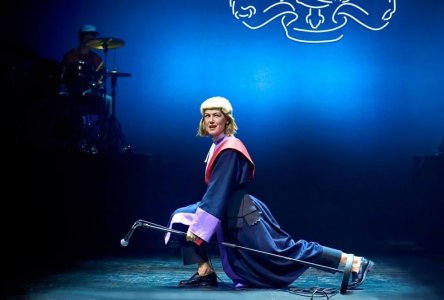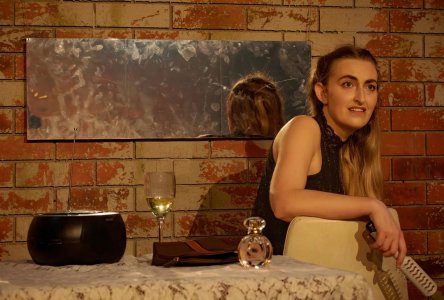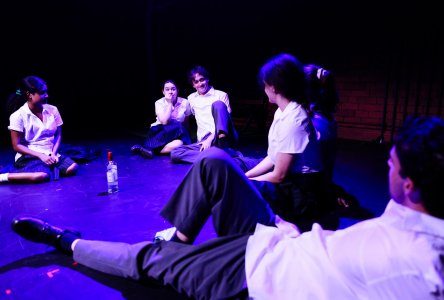-c750x442.jpg)
THE PRESENT
THE PRESENT, Sydney Theatre Company and UBS at the Roslyn Packer Theatre, 4 August-19 September 2015. Photography by Lisa Tomasetti: above - the company, right: Richard Roxburgh and Cate Blanchett.
Making theatre without the best possible script is akin to building a house without foundations: it may work temporarily but before the night is out the wobbly structure will come crashing down. It’s what happens when anyone attempts to stage in its entirety Anton Chekhov’s first and for long unknown play Platonov, otherwise known as The Play Without a Title.
Written when the playwright was just 20, it was an enormous pile of paper that, if played out in full, would sprawl across five bewildering hours. It was turned down by the Maly Theatre for whose star Maria Yermolova he wrote it and it disappeared into a bank deposit box and was not discovered until years after his death.
All successful interpretations since have been edited, adapted or rewritten and that is what Andrew Upton has done to arrive at “The Present after Anton Chekhov’s Platonov” and it is possibly Upton’s best work to date. It provides the rock solid foundation upon which visiting director John Crowley and 13 of Australia’s finest and most carefully cast actors have built a memorable production.
The title alludes to the here and now, but could also as easily reference the gifts – welcome and otherwise – brought and given to Anna Petrovna (Cate Blanchett) on the occasion of her 40th birthday. The party venue is the dacha – summer home in the country – that belonged to Anna’s late husband, the General. And the guests are his son Sergei (Chris Ryan), his wife Sophia (Jacqueline Mackenzie); old friend and local STD doctor Nikolai (Toby Schmitz) and his current sort-of girlfriend Maria (Anna Bamford) and school teacher Mikhail Platonov (Richard Roxburgh) and his new wife Sasha (Susan Prior). Also turning up at various points are bonhomie-ridden Ivan (Marshall Napier), snaky city boy DJ Kiril (Eamon Farren) and his pal Dimitri, a uni student of unpleasantly conservative outlook (Brandon McClelland).
Their collective pasts and relationships are deeply intertwined. The older men consider themselves best friends, the youngsters despise them, while Sophia and Platonov “knew” each other 17 years previously, and he and Anna have harboured unrequited mutual lust – and possibly love – for years. And, of course, Maria fancies him too. The casting of Roxburgh in this role could not be bettered. He oozes irresistible, world-weary and self-deprecating charisma and it makes the interest of all these gorgeous women totally plausible.
Nevertheless, it’s Russia and it’s Chekhov so disappointment is a powerful presence in their lives. In this instance Andrew Upton has cunningly moved the action to the mid-90s, so the dreams of Perestroika are crumbling and the cruel buffoonery of Boris Yeltsin’s reign is crushing what hopes remain. The rise of the oligarch and the return of repression is lurking somewhere over the horizon and becomes a presence when a coldly pragmatic Alexei (Martin Jacobs) arrives to check out Anna as a marriage-business prospect, and a chilly bureaucratic presence in Yegor (David Downer) observes from the margins.
Upton has also made his chief protagonists older and therefore less optimistic than Chekhov’s original gilded youth. Finally, with the intervention of the muscular, stone-faced and sinister “security” man Osip (Martin Buchanan) the re-ascendance of the KGB and Vladimir Putin is foreshadowed.
-c750x442.jpg)
Chosen by Crowley as his creative team after seeing their work on STC’s The Maids, Alice Babidge (set and costume design) and Nick Schlieper (lighting design) have created a deceptively simple but intricately interconnected series of three settings: the terrace outside the dacha where the friends gather, the balloon-festooned summer house in the grounds where the dinner is held, and the interior of the dacha looking out to the terrace next morning.
It’s an almost funny but painfully accurate rendition of post-Soviet middle class style – or lack thereof – aggressively concrete and stark, no rich tsarist timber and sumptuous colour to be seen. They live with brightly uncomfortable lights as if to emphasise that they can afford electricity. The lack of charm and comfort is extreme, but as Chekhov himself wrote in a letter, “comfort and convenience possess a magical power; little by little they suck in even people with strong wills.” Pity the bourgeoisie, then and Platonov whose life is heading for disappointment despite early promise.
The terrace is where Anna twitchily awaits her guests with the first of many cigarettes and a desultory game of chess with Nikolai who has given her the set for her birthday. “God, I hate chess,” she mutters grumpily. Upton has also gifted his wife with a role that encourages her to do her very best. Anna’s irritation is almost palpable as her boredom at what’s slowly and painfully unfolding – another dreary gathering – clashes with her determination to be a good hostess. As time goes by ennui gradually metamorphoses into tension and sexual energy as she and Platonov carefully avoid each other. Her yearning and his unease are initially painful but what happens next turns to uninhibited clownish comedy and we are reminded how lacking in vanity and therefore how truly gutsy are both principals.
The same can be said for Susan Prior as Sasha, the frilly, floral hausfrau whose marriage to Platonov is her dream but actually a nightmare. Like bees to a honey jar, the other women circle him and somehow his passivity in the face of their hunger highlights Sasha’s frumpiness and well-founded anxiety. It’s not a big part in stage time for Prior, but she makes it indelible and powerful.
These performances can only really fly, however, because they’re buoyed up by a painstakingly orchestrated and intelligent company. John Crowley’s attention to detail and ear for the often staccato and always apposite rhythms of Upton’s text makes for compelling theatre. And all this is punctuated and linked by Stefan Gregory’s sound design and use of Joy Division’s Love Will Tear Us Apart – as a sadly apt anthem.
At three hours including an interval, The Present is demanding, hugely entertaining and also leaves much emotional and intellectual residue to ponder later. The opening night audience, perhaps tipsy in the presence of dazzling star power, was awash with wild giggling at times, inopportune and otherwise, begging the question: what's the point of striving for such excellence when cheap laughs would do. Nevertheless, it’s a high note to end on for outgoing artistic director Upton after his other recent achievements in Endgame and Waiting For Godot. If you can possibly beg, borrow or hijack a ticket: do it.



